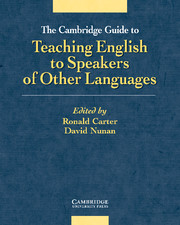Book contents
- Frontmatter
- Contents
- List of figures
- List of abbreviations
- Acknowledgements
- List of contributors
- Introduction
- Chapter 1 Listening
- Chapter 2 Speaking
- Chapter 3 Reading
- Chapter 4 Writing
- Chapter 5 Grammar
- Chapter 6 Vocabulary
- Chapter 7 Discourse
- Chapter 8 Pronunciation
- Chapter 9 Materials development
- Chapter 10 Second language teacher education
- Chapter 11 Psycholinguistics
- Chapter 12 Second language acquisition
- Chapter 13 Bilingualism
- Chapter 14 Sociolinguistics
- Chapter 15 Computer-assisted language learning
- Chapter 16 Observation
- Chapter 17 Classroom interaction
- Chapter 18 English for academic purposes
- Chapter 19 English for specific purposes
- Chapter 20 Assessment
- Chapter 21 Evaluation
- Chapter 22 Syllabus design
- Chapter 23 Language awareness
- Chapter 24 Language learning strategies
- Chapter 25 Task-based language learning
- Chapter 26 Literature in the language classroom
- Chapter 27 Genre
- Chapter 28 Programme management
- Chapter 29 Intercultural communication
- Chapter 30 On-line communication
- Postscript: The ideology of TESOL
- Glossary
- References
- Index
Chapter 13 - Bilingualism
Published online by Cambridge University Press: 07 September 2010
- Frontmatter
- Contents
- List of figures
- List of abbreviations
- Acknowledgements
- List of contributors
- Introduction
- Chapter 1 Listening
- Chapter 2 Speaking
- Chapter 3 Reading
- Chapter 4 Writing
- Chapter 5 Grammar
- Chapter 6 Vocabulary
- Chapter 7 Discourse
- Chapter 8 Pronunciation
- Chapter 9 Materials development
- Chapter 10 Second language teacher education
- Chapter 11 Psycholinguistics
- Chapter 12 Second language acquisition
- Chapter 13 Bilingualism
- Chapter 14 Sociolinguistics
- Chapter 15 Computer-assisted language learning
- Chapter 16 Observation
- Chapter 17 Classroom interaction
- Chapter 18 English for academic purposes
- Chapter 19 English for specific purposes
- Chapter 20 Assessment
- Chapter 21 Evaluation
- Chapter 22 Syllabus design
- Chapter 23 Language awareness
- Chapter 24 Language learning strategies
- Chapter 25 Task-based language learning
- Chapter 26 Literature in the language classroom
- Chapter 27 Genre
- Chapter 28 Programme management
- Chapter 29 Intercultural communication
- Chapter 30 On-line communication
- Postscript: The ideology of TESOL
- Glossary
- References
- Index
Summary
Introduction
Bilingualism refers to the phenomenon of competence and communication in two languages. A bilingual individual is someone who has the ability to communicate in two languages alternately. Such an ability or psychological state in the individual has been referred to as bilinguality (Hamers and Blanc 2000). A bilingual society is one in which two languages are used for communication. In a bilingual society, it is possible to have a large number of monolinguals (those who speak only one of the two languages used in that society), provided that there are enough bilinguals to perform the functions requiring bilingual competence in that society. There is therefore a distinction between individual bilingualism and societal bilingualism.
The above definitions seem fairly straightforward. What makes it difficult to apply such definitions is the disagreement over what constitutes competencies in two languages. Several questions have been asked:
Monolingual or communicative norms: Do we measure the competencies of bilingual persons against the respective competencies of monolingual persons? If so, we end up with labelling some bilinguals as perfect bilinguals (a small minority) and others as imperfect bilinguals (the vast majority). Another approach is not to apply monolingual norms in measuring bilingual abilities but just to evaluate the communicative competence of the bilingual as a whole (Grosjean 1992).
Relative competencies in two languages: Is the bilingual better at one language than the other? If so, the person has dominant bilinguality. If he or she is equally good at both languages, then the term balanced bilingual is used (Hamers and Blanc 2000).
[…]
- Type
- Chapter
- Information
- Publisher: Cambridge University PressPrint publication year: 2001
- 4
- Cited by



